Learn how to make this easy and delicious fermented elderberry soda with ginger and honey! It can be made with a wild yeast starter made with foraged elderberries, or a ginger bug. It’s the perfect natural soda for late summer and fall!
Elderberry Season
Elderberry season is always an exciting time. I love watching the local elderberry trees come into flower in the summer, then slowly start producing berries as fall approaches.
Fall is by far my favorite season, so this is the beginning of wonderful things to come in my mind! I also love fall foraging.
Elderberries are amazing for the immune system, so this is the perfect time of year to make up a batch of immune boosting elderberry syrup or fermented elderberry honey.
But, I had something else in mind this time. Lately I’ve been loving making naturally fermented sodas, either with a wild yeast starter or with a ginger bug.
Because the blue elderberries that we get here in the western states have a natural yeast bloom on them, I decided to make a wild fermented elderberry soda!
Making Wild Yeast Starter with Elderberries
The first step in making this fermented elderberry soda is to make a wild yeast starter.
I used the same basic recipe as I did in my How to Make a Wild Yeast Starter, but I used elderberries instead of juniper berries. It worked perfectly, and within about four days I had a nice bubbly starter!
Combine the elderberries, sugar, and water in a quart sized jar covered with a tea towel and rubber band, or a fermenting airlock system.
Stir vigorously three times per day, and within 4-5 days you should start to see bubbles forming. Strain out the elderberries when you are ready to make the soda.
If your elderberries don’t have much of a wild yeast bloom on them, or you want to do it a different way, you can also make this soda with a ginger bug instead.
Simply replace the wild yeast starter in the recipe with an active ginger bug.
Fermented Elderberry Soda Recipe
Once your starter is going, it’s time to make the elderberry soda.
Combine the water, elderberries, ginger, and cinnamon stick in a large pot and bring to a boil. Turn the heat down to medium and simmer for 20 minutes. Turn off the heat and let the mixture come to room temperature.
Strain the elderberry and ginger mixture into a wide mouth gallon jar and stir in the honey.
Add the strained elderberry starter (or ginger bug) to the gallon jar, then cover the jar with a cheesecloth and rubber band. Put in a cool and dark place to ferment, stirring vigorously daily.
You should start to see active fermentation in the jug after only a day or two. Let it ferment for 5-7 days, then transfer into flip top bottles.
Be extra careful not to bottle too soon so that you don’t get exploding bottles. If fermentation hasn’t died down after a week I would wait a little bit longer before you transfer to bottles.
Let the bottles sit at room temperature for a day or two to build up carbonation, then refrigerate.
My favorite place to buy bottles and jars is Fillmore Container. They have an awesome selection of all kinds of cool jars!
I am so happy with how this elderberry soda turned out! Pleasantly tart and gingery, with a hint of cinnamon. It’s super fizzy and delicious!
Be aware, as with any ferment, that there is a small amount of alcohol present in this elderberry soda, and that amount can vary depending on the fermenting conditions. It should be relatively low, however.
This wild elderberry soda is so great for your health because it’s full of immune boosting goodness with elderberries, ginger, cinnamon, and honey. And, best of all, it’s naturally fermented!
Another fun thing to make with elderberries is elderberry mead (honey wine).
Or if you really want to boost your immune system you can make an elderberry tincture or elderberry syrup.
For more elderberry recipes, see my post on 70+ Elderberry Recipes & Remedies for Food & Health!
Cheers to your health!
Naturally Fermented Soda Recipes
Here are some more naturally fermented soda recipes for you to try.
- Strawberry Rhubarb Soda
- Fermented Apple Ginger Beer
- Fermented Root Beer
- Turmeric Soda
- Sweet Potato Kvass
- Kefir Soda
- Winter Herb Kvass
Fermented Elderberry Soda with Ginger and Honey
Equipment
Ingredients
Wild Yeast Starter
- 3/4 cup fresh elderberries
- 1/2 cup sugar
- 2 cups non-chlorinated water
Elderberry Soda
- 3 quarts water
- 2 cups fresh elderberries or 1 cup dried
- 1/4 cup sliced ginger
- 1 cinnamon stick
- 1 cup honey
Instructions
Wild Yeast Starter
- To make the wild yeast starter, combine the elderberries, sugar, and water in a quart sized jar covered with a tea towel and rubber band, or a fermenting airlock system.
- Stir vigorously three times per day, and within 4-5 days you should start to see bubbles forming. Strain out the elderberries when you are ready to make the soda.
Elderberry Soda
- Once your starter is going, it's time to make the soda. Combine the water, elderberries, ginger, and cinnamon stick in a large pot and bring to a boil. Turn the heat down to medium and simmer for 20 minutes. Turn off the heat and let the mixture come to room temperature.
- Strain the elderberry/ginger mixture into a wide mouth gallon jar and stir in the honey.
- Add the strained elderberry starter (or ginger bug) to the gallon jar, then cover the jar with a cheesecloth and rubber band. Put in a cool and dark place to ferment, stirring vigorously daily.
- You should start to see active fermentation in the jug after only a day or two. Let it ferment for 5-7 days, then transfer into flip top bottles.
- Let the bottles sit at room temperature for a day or two to build up carbonation, then refrigerate.
Notes
- If you would rather use a ginger bug, you can skip making the wild elderberry starter and use about one cup of active ginger bug when making the soda instead.
- Be extra careful not to bottle too soon so that you don't get exploding bottles. If fermentation hasn't died down after a week I would wait a little bit longer before you transfer to bottles.
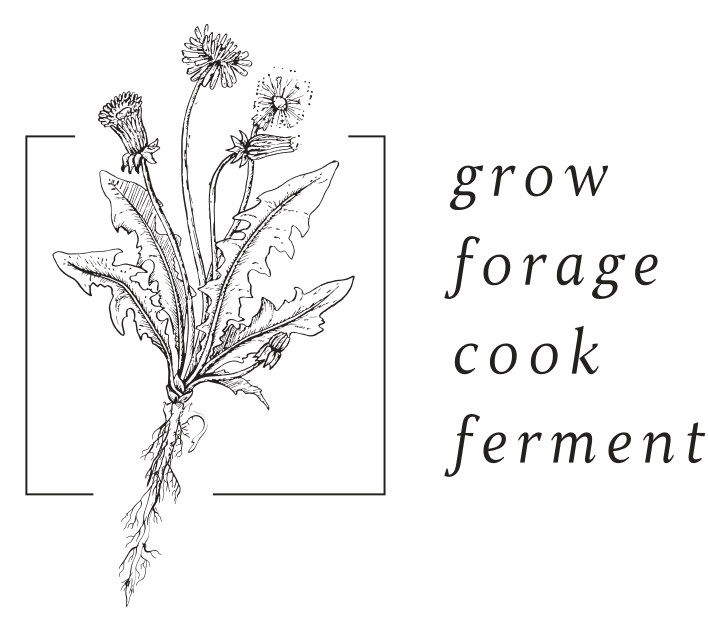
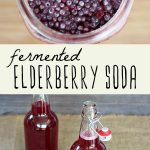
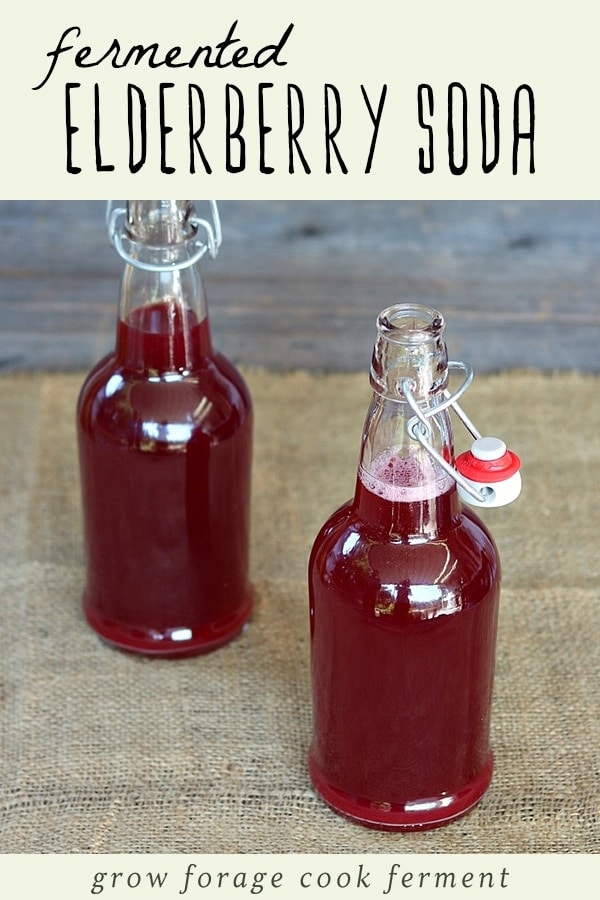
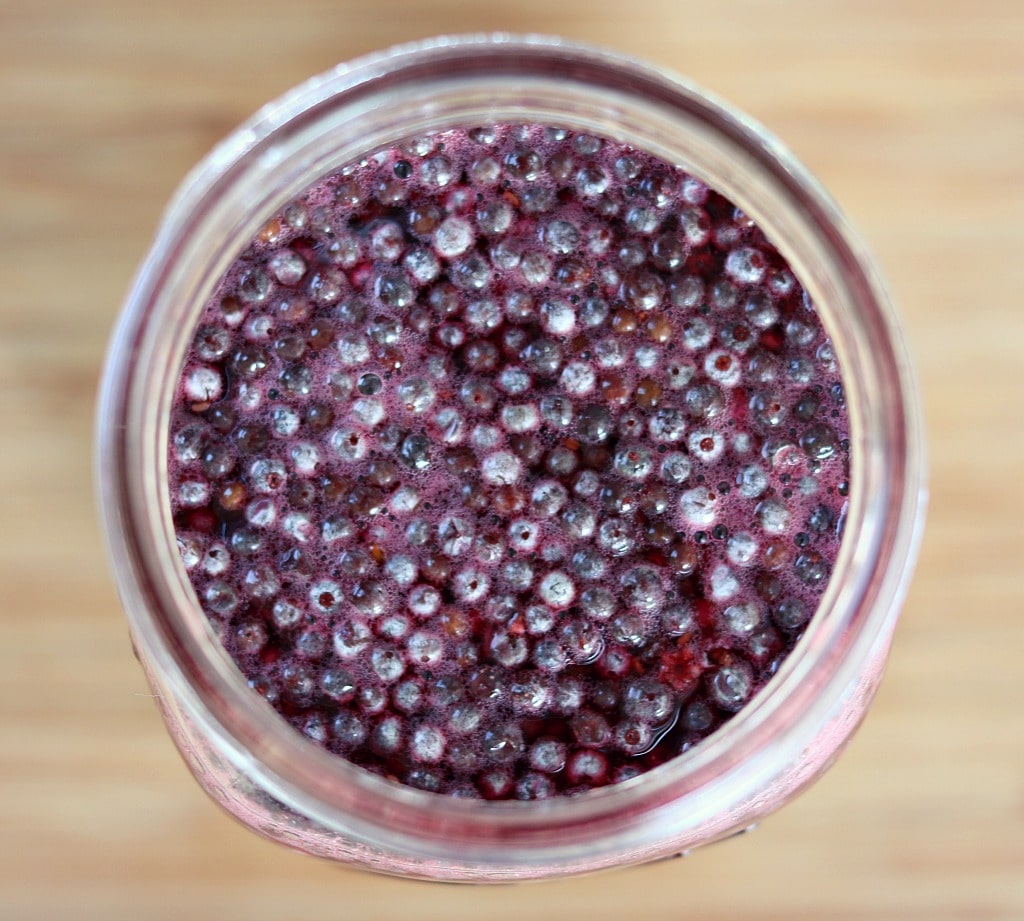
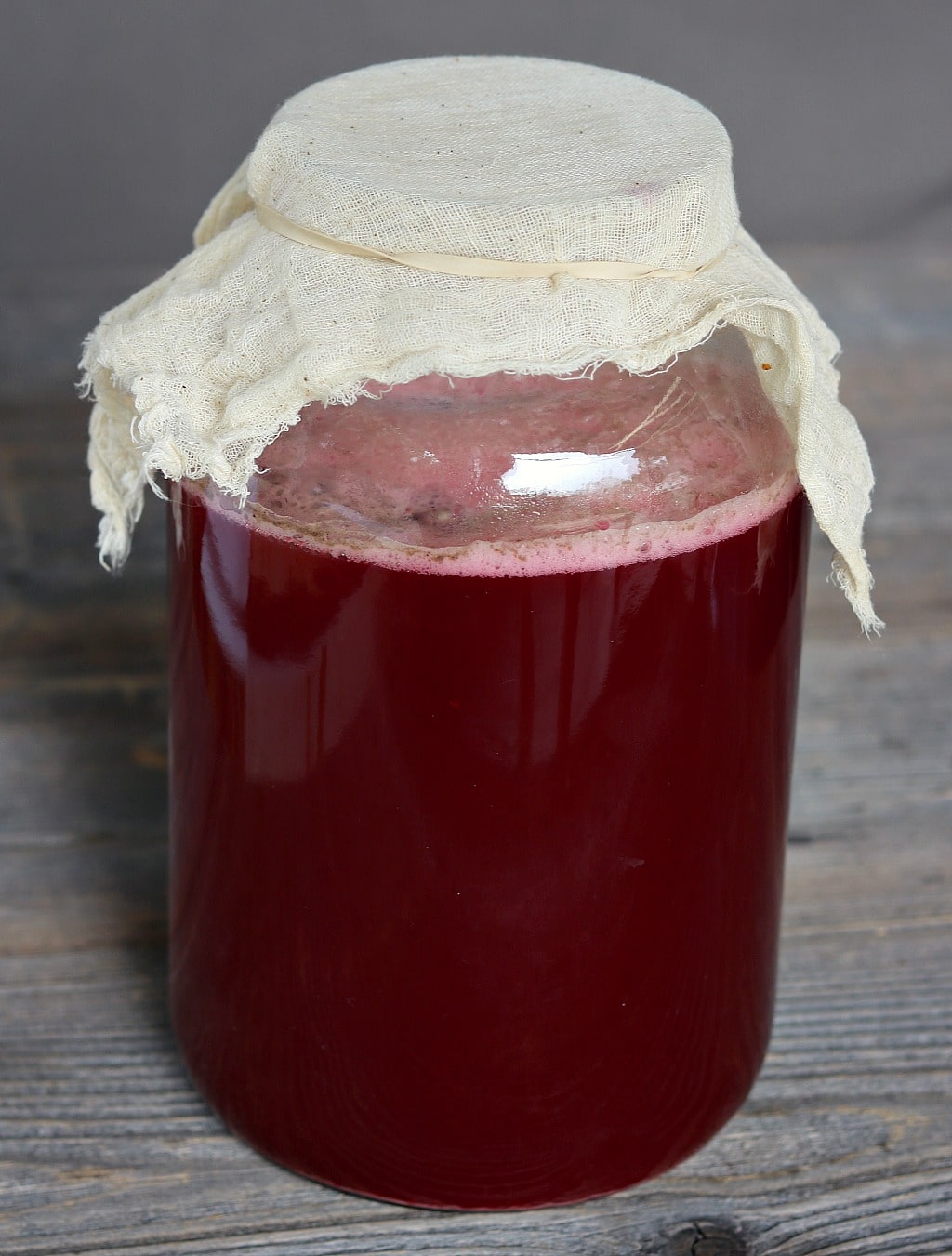
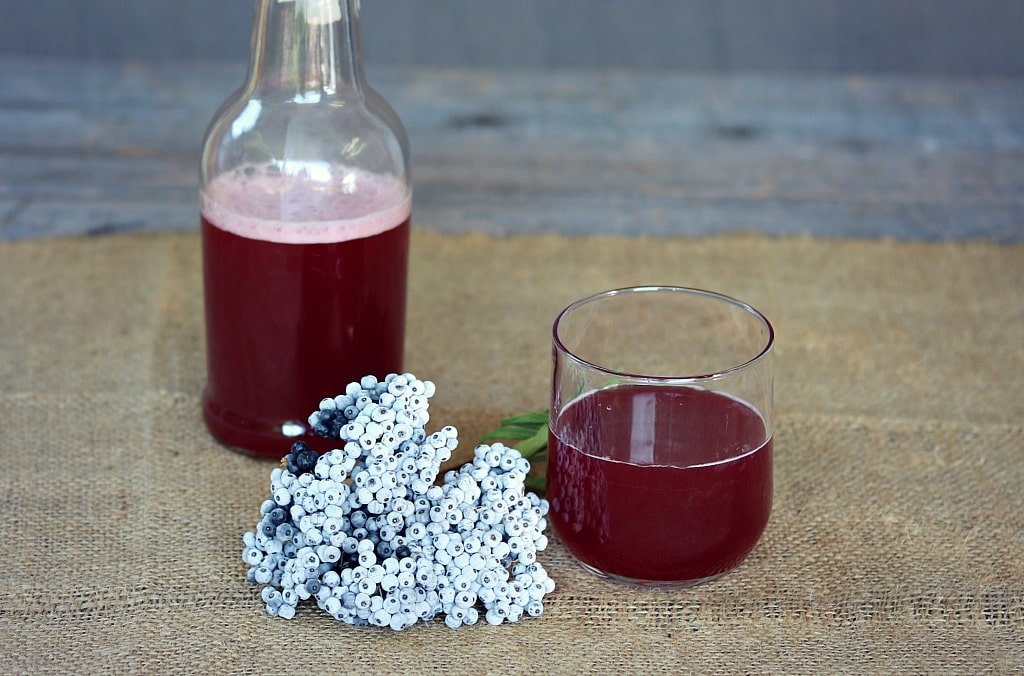
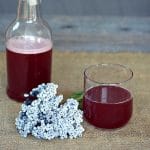

Ope, found it. I’m guessing if I would use 1/2 cup ginger bug then I could use 1/2 cup juniper berry wild yeast starter solution instead.
I haven’t tried it myself, but it could work.
Hi thanks so much for sharing and caring 😊. Was wondering how long the soda would last after you made it and it in the fridge. Thank you.
Probably about 2 weeks.
I have a juniper berry wild yeast solution ready to use. Looking at this recipe, I would guess I would use about 2 cups of that solution to this recipe if skipping the elderberry wild yeast starter?
Is there such a thing as leaving the fermentation too long before bottling? I may have left it too long as it’s tasting slightly vinegary. Is it still usable for something if in fact I have left it too long? I’ve bottled it regardless and waiting on your reply.
Hi Anna, sorry for the delay in my reply. Many ferments will turn to vinegar after a while, that is how vinegar is made! So that could be what happened. That said, fermented sodas do often have a slight vinegary taste to them.
I have an elderberry starter happening, but I didn’t boil the berries before starting the starter (sorry, couldn’t resist!). Is it still safe to use? Does the fermentation process neutralize elderberry’s potentially nasty cyanogenic properties? I’ve made syrup for years with elderberries, but of course they are boiled in that process…
Yes, it’s safe. You actually don’t want to boil the berries as that would kill of the natural yeast. The fermentation process mitigates any potential toxins.
Hi Can I use frozen elderberries to make the wild yeast starter?
I haven’t tried it, but I think it would work!
Thank you. Using frozen elderberries worked great. I’m now on to Step 2 and I’m stirring my jar once a day. I’ve noticed a lot of foam/bubbling action on top but today I noticed what looks like darker scum on top too. Do I just stir that in? Or skim it off? Has my batch been contaminated with mold? I’ve made kombucha before and know when I’ve had mold in it and needed to toss, but this i’m not sure.Thank you for your time.
If it’s fuzzy mold then yes, it should be thrown out. If it’s just dark scum, that is normal in the fermentation process and I wouldn’t worry about it!
Is it okay to just drink the starter once done as is? It is absolutely delicious and was wondering about that!
Wonderful recipes. I so look forward to trying them. What was the wildcrafting book that you mentioned. I saw the mention once and then couldn’t find it again – not sure why. Thanks.
Can I use dried elderberries as I don’t have access to fresh.
Can i use dried elderberries as the starter as i too can’t get fresh, thank you
My berries are fermenting! Do I have to start making the soda tonight? If I can wait till tomorrow, should I refrigerate it? I worry about mold. I’ve stirred it twice today.
Are you still active on this blog? I subscribed to your page and I’m getting emails…I was looking for guidance in finishing my soda. I’m only on morning 5 of fermenting but it seems quiet. It didn’t fizz up like previous mornings. Do I bottle now? I don’t want exploding bottles! txs.
Hi Suzanne! Yes I’m still active here, but I do get a lot of questions and comments so it sometimes takes me a while to answer :) If the ferment has finished bubbling then it is fine to bottle! No need to worry about mold, that is rare in these types of ferments. Now that there are less bubbles there is much less of a risk of exploding bottles. If you are worried you can always “burp” the bottles every day or two to let off pressure. If there doesn’t seem to be any built up pressure after a few days of burping then you don’t need to worry about it anymore. Hope that helps!
Thank you so much. I wasn’t trying to hurry you, I just didn’t want to ask questions for naught! Ha. I went ahead and bottled after I wrote you, and since a few tiny bubbles were crawling up the jar, I put them outside for the night. (I know I’m a weeny, but I rent). I opened them 2 days later (outside) and got fizz (Yay!) that overflowed…outside, but probably only lost 3T per bottle. I let it settle, recapped, let it set for 2 hours at room temp, and put it in the fridge. I’m taking it to a bbq Saturday. It tastes great. Thanks so much for the recipe. I’m working on my second batch today. Starter is ready. Your easy instructions gave me the confidence to go for it. :)
This looks amazing. I would love to start making some ferments. This drink sure does inspire some motivation.
When you say stir vigorously everyday does that mean shaking the jar or removing the cloth and stirring it? Thanks ????
I stirred it with a big wooden spoon… shaking it with a lid would cause an explosive mess from the carbonation that’s forming!
When using a ginger bug, what quantity do I use?
Hi there! Do you know what the shelf life of these drinks are? Would the bottles keep a couple months? Thanks !